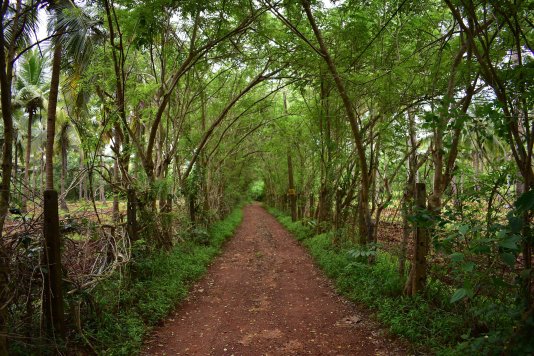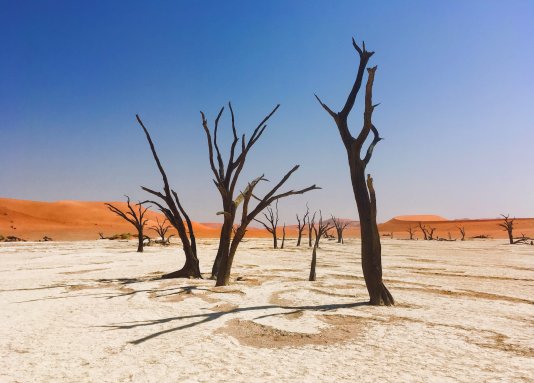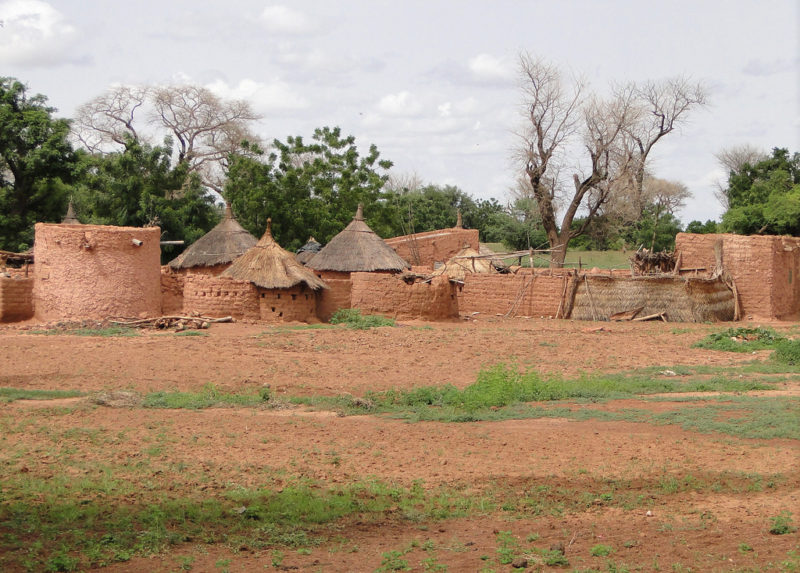- About
- Topics
- Picks
- Audio
- Story
- In-Depth
- Opinion
- News
- Donate
-
Signup for our newsletterOur Editors' Best Picks.Send
Read, Debate: Engage.
| November 07, 2022 | |
|---|---|
| topic: | Climate Change |
| tags: | #COP27, #Africa, #climate change, #climate justice, #climate colonialism |
| located: | Zimbabwe, Egypt, Nigeria, Malawi, Uganda, Mozambique, Tunisia, USA, China |
| by: | Cyril Zenda |
Although it has been more than three years since Cyclone Idai hit southern Africa, causing untold devastation in Zimbabwe, Mozambique and Malawi, to Yevai Simango, a 32-year-old mother of four, the event is still fresh in her mind and evident in her everyday life.
"We are still feeling its effect to this very day,” Simango told FairPlanet, while struggling to sell her bananas in the capital Harare.
The cyclone had killed 341 people and dozens went missing, while more than 270,000 others were variously affected.
For more than a year after the cyclone, Simango and her fellow farmers from Chimanimani - some 430 km east of Harare - would watch their produce rot as they could not take them to the market since virtually all the roads had been damaged.
A final report of the International Federation of Red Cross on the impact of the disaster on Zimbabwe summed up the destruction as follows: "More than 50% land under maize crop, banana plantation and tubers like yams was wiped away, 18 irrigation schemes affected, at least 362 cattle and 514 goats and sheep, 17000 chickens were lost, whilst 86 dipping facilities were damaged."
While for the outside world these could be perceived as mere statistics, it is not so for Simango and other impoverished villagers in the Chimanimani and Chipinge districts of Zimbabwe, where the cyclone hit most severely. "We will never recover from this," Simango said dejectedly.
The World Bank estimated the economic cost of direct damages – for destroyed infrastructure, properties, crops, and livestock - at USD $622 million.
According to Professor Desmond Manatsa, president of the African Alliance for Disaster Risk Institutes, signs of climate change are there for all to see.
"Rainfall extremes have increased, meaning that floods and droughts are now occurring more frequently and back-to-back within the same season […]mid-season dry spells' frequency has also increased,” Professor Manatsa, who is also Executive Dean in the Faculty of Science and Engineering at the Bindura University of Science Education (BUSE) in Zimbabwe, told FairPlanet.
Referring to the situation in Zimbabwe, the climate scientist revealed that both minimum and maximum temperatures had increased by about 1°C since the 1980s, hence the reduced soil moisture through evapotranspiration.
According to the Zimbabwe Meteorological Services Department, daily minimum temperatures have risen by approximately 2.6°C over the last century, daily maximum temperatures have risen by 2°C during the same period and the number of cold days have decreased and of hot days increased.
At the same time, rainfall and runoff decreased by 20 and 30 percent, respectively, and the frequency of droughts has increased from once per decade to about once every three years.
So serious is climate change in Zimbabwe that the Global Climate Risk Index ranked the southern African nation among the top 20 countries in the world most affected by the impacts of extreme weather events between 2000 and 2019.
As the effects of climate change bite deeper, each community across Africa - a continent of 1.2 billion people - has its own version of similarly sad stories to tell as they count their losses.
These losses continue to grow daily, as catastrophes that range from cyclones and super-storms to droughts, floods, locust invasions and everything in between - all effects of climate change caused by the relentless release of carbon emissions into the atmosphere - become more frequent.
The continent accounts for just 4 percent of global carbon dioxide emissions, compared to China’s 23 percent, the United States’ 19 percent and the European Union’s contribution of 13 percent, according to the United Nations Inter-governmental Panel on Climate Change (IPCC), yet it is among those suffering the worst depredations of climate change.
According to a report released in September by the United Nations’ World Meteorological Organization, Africa’s islands and coastal states - and the 116 million people who inhabit them - will be heavily exposed to rising seas and will spend about $50 billion in damages by 2050.
The report added that drought over the last 50 years in east and southern Africa, worsened by climate change, has claimed the lives of over half a million people, with losses estimated at $70 billion. Over 1,000 floods in the same time period claimed over 20,000 lives, it said.
Roland Olivier Dedi, founder of the Youth Network for Community Development (RJDC) in Ivory Coast who also serves as a national focal point for the African Youth Initiative on Climate Change (AYICC) in his country, understands exactly how climate change is wrecking lives across the continent.
"Africa is experiencing the greatest climate impacts of any region in the world," Dedi wrote to FairPlanet. "From more frequent and longer heat waves to droughts, floods and cyclones, these phenomena are already affecting millions of Africans and threatening their livelihoods. There are also harvest disruptions and heavy rains, sometimes accompanied by material and human damage."
With scientists predicting an increase of the rate and severity of such catastrophes, the cost of damage caused by climate change in Africa is expected to rise significantly as the world warms, and activists and officials express mounting concerns over how to pay for it.
This is why "loss and damage finance" is taking centre stage at the 27th session of the Conference of the Parties (COP27) that is running from November 6 to 18 in Sharm El-Sheikh, Egypt. Climate justice activists say the success of this year’s summit rests on its ability to get money flowing from wealthy countries to those most in need - at the pace and scale required to match the climate crisis.
For Africa, COP27 follows a year of heightened impacts from climate change, alongside the related effects of rising food and fuel costs, Russia’s war in Ukraine, and COVID-19.
Although they are already feeling its effects, most Africans are not literate about the glaring climate crisis, according to a study by scientists at the University of Cape Town, South Africa.
Climate change literacy relates to how people understand the causes of climate change and its potential in the world. Scientists say that without it, people will be less able to adapt to projected adverse economic and environmental impacts.
"[An] analysis of Africa’s largest representative public opinion survey shows climate change literacy ranges from 23 to 66% of the population across 33 countries, with larger variation at subnational scales (for example, 5–71% among states in Nigeria)," said the scientists, who based their research on a 2018 survey carried out by pan-African research organisation Afrobarometer.
For example, Mauritius was found to have a climate change literacy rate of 66 percent, while Uganda had 62 percent, but for Mozambique and Tunisia the levels were as low as 25 percent and 23 percent, respectively.
The continent’s average climate literacy rate is just over 12 percent.
"Many people hear talk about climate change, but do not have a deep understanding about it or [an] impulse to protect the environment," Dedi said. "More climate education is needed."
While climate change illiterate villagers like Simango are quick to surrender to fate as they attribute their losses to the "act of God," African climate scientists and climate justice activists who are aware of the source of the problem are urging their governments to demand that the big emitters pay for the damage resulting from their actions.
To Dedi, these losses make the concept of loss and damage more relevant to Africa.
"The concept [of loss and damage] is relevant because Africa has not yet adapted to climate change in terms of risks and disasters and remains one of the most vulnerable continents,” Dedi said. "Adaptation policy needs to be put in place or mandated urgently in the agendas of African countries."
Green Governance Zimbabwe Trust director Frank Mpahlo explained how loss and damage is measured.
"Measuring the impacts of climate change pertains to tracking set indicators on how climate events such as cyclones and drought have potentially disrupted the way of living of a given group of people,” Mpahlo told FairPlanet.
"Therefore, changes in income, health and even access to natural resources as a result of climate change are some of the indicators that can be used to measure the impact of climate change on communities," he added. "This data is key in determining the level and expanse of help needed."
Activists say African countries need finance both to adapt and build resilience to climate change impacts such as droughts, floods, super-storms and locust invasions, and to develop in a low emissions and sustainable manner.
One of the biggest points of contention at COP27 is predicted be the developed world’s failure so far to fulfill its promise to mobilise USD $100 billion per year in climate finance by 2020.
As African negotiators join others in the Egyptian resort city, Ivory Coast’s Dedi is hopeful.
"I want COP27 to deliver on 5 things: an increase in climate finance to and from African countries; more climate transparency on the progress of climate action - we need to see measurable and sustainable results; a stock-take of progress made against COP26 commitments, and some kind of economic or other political consequence for those that fail to meet their pledges; progress on climate action should be a condition of development aid; and big emitters and great powers must do more to urgently reduce their emissions, and if they don’t there should be economic and political consequences."
With the world's biggest emitters searching high and low for excuses to avoid paying for the damage they inflict, it remains to be seen how much African nations will get out of COP27.
Image by Picture by Hu Chen.


By copying the embed code below, you agree to adhere to our republishing guidelines.

